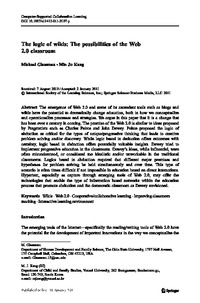The logic of wikisThe possibilities of the Web
2.0 classroom
Michael Glassman, Min Ju Kang
Publikationsdatum:
|
 |
 Diese Seite wurde seit 2 Jahren inhaltlich nicht mehr aktualisiert.
Unter Umständen ist sie nicht mehr aktuell.
Diese Seite wurde seit 2 Jahren inhaltlich nicht mehr aktualisiert.
Unter Umständen ist sie nicht mehr aktuell.
 Zusammenfassungen
Zusammenfassungen
The emergence of Web 2.0 and some of its ascendant tools such as blogs and
wikis have the potential to dramatically change education, both in how we conceptualize
and operationalize processes and strategies. We argue in this paper that it is a change that
has been over a century in coming. The promise of the Web 2.0 is similar to ideas proposed
by Pragmatists such as Charles Peirce and John Dewey. Peirce proposed the logic of
abduction as critical for the types of unique/progressive thinking that leads to creative
problem solving and/or discovery. While logic based in deduction offers outcomes with
certainty, logic based in abduction offers potentially valuable insights. Dewey tried to
implement progressive education in the classrooms. Dewey’s ideas, while influential, were
often misunderstood, or considered too idealistic and/or unworkable in the traditional
classrooms. Logics based in abduction required that different major premises and
hypotheses for problem solving be held simultaneously and over time. This type of
scenario is often times difficult if not impossible in education based on direct interactions.
Hypertext, especially as capture through emerging tools of Web 2.0, may offer the
technologies that enable the type of information based networks within the education
process that promote abduction and the democratic classroom as Dewey envisioned.
Von Michael Glassman, Min Ju Kang im Text The logic of wikis (2011)  Dieser wissenschaftliche Zeitschriftenartikel erwähnt ...
Dieser wissenschaftliche Zeitschriftenartikel erwähnt ...
 Personen KB IB clear | Albert-László Barabási , Gregory Bateson , Carl Bereiter , Tim Berners-Lee , Amy Bruckman , Ulrike Creß , John Dewey , Mark Fischetti , Andrea Forte , Joachim Kimmerle , Thomas S. Kuhn , E. Raymond , Howard Rheingold , Marlene Scardamalia | |||||||||||||||||||||||||||||||||||||||||||||||||||||||||||||||||||||||||||||||||||||||||||||||||||
 Begriffe KB IB clear | Deduktion
,  Hyperlink Hyperlink Hyperlink
, Hyperlink
,  Hypertext Hypertext hypertext
, Induktion
, hypertext
, Induktion
,  Innovation Innovation innovation
, innovation
,  Internet Internet internet
, Reggio-PädagogikReggio approach
, Semantic Websemantic web
, WebCT
, internet
, Reggio-PädagogikReggio approach
, Semantic Websemantic web
, WebCT
,  Weblogs Weblogs blogging
, Wikiwiki
, Wiki in educationWiki in education blogging
, Wikiwiki
, Wiki in educationWiki in education
| |||||||||||||||||||||||||||||||||||||||||||||||||||||||||||||||||||||||||||||||||||||||||||||||||||
 Bücher |
| |||||||||||||||||||||||||||||||||||||||||||||||||||||||||||||||||||||||||||||||||||||||||||||||||||
 Texte |
|
 Dieser wissenschaftliche Zeitschriftenartikel erwähnt vermutlich nicht ...
Dieser wissenschaftliche Zeitschriftenartikel erwähnt vermutlich nicht ... 
 Nicht erwähnte Begriffe | Blackboard, RDF, Weblogs in education, Wikipedia |
 Tagcloud
Tagcloud
 Zitationsgraph
Zitationsgraph
 Zitationsgraph (Beta-Test mit vis.js)
Zitationsgraph (Beta-Test mit vis.js)
 Zeitleiste
Zeitleiste
 Anderswo finden
Anderswo finden
 Volltext dieses Dokuments
Volltext dieses Dokuments
 Anderswo suchen
Anderswo suchen 
 Beat und dieser wissenschaftliche Zeitschriftenartikel
Beat und dieser wissenschaftliche Zeitschriftenartikel
Beat hat Dieser wissenschaftliche Zeitschriftenartikel während seiner Zeit am Institut für Medien und Schule (IMS) ins Biblionetz aufgenommen. Beat besitzt kein physisches, aber ein digitales Exemplar. (das er aber aus Urheberrechtsgründen nicht einfach weitergeben darf). Es gibt bisher nur wenige Objekte im Biblionetz, die dieses Werk zitieren.
























 , 200 kByte)
, 200 kByte)  Biblionetz-History
Biblionetz-History